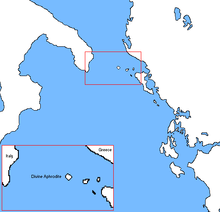Divine Aphrodite (island nation)
| This page is a work in progress by its author(s) and should not be considered final. |
| Theocracy Of Divine Aphrodite Θεία Ἀφροδίτη
|
||||
|---|---|---|---|---|
|
||||
| Motto: A Heart That Loves Is Always Young | ||||
| Anthem: The Herald Of The Goddess | ||||
Divine Aphrodite's location within the Ionian Sea.
|
||||
| Capital | Carthonia | |||
| Official languages | Greek ∙ English | |||
| Demonym | Aphrodites | |||
| Government | ||||
| - | Queen | Elena Pallas | ||
| Area | ||||
| - | Total | 12 km2 5 sq mi |
||
| Population | ||||
| - | census | 2,880 | ||
| Currency | Euro (EUR) |
|||
| Time zone | EET (UTC+2) | |||
| - | Summer (DST) | EEST (UTC+3) | ||
| Calling code | +301 | |||
| Internet TLD | .da | |||
Divine Aphrodite (Greek: Θεία Ἀφροδίτη), known simply as Aphrodite by it's residents, is a small island in the Ionian Sea, westwards from the islands of Corfu and Othonoi, as well as Greece itself.
Etymology
The name originates from their worshipped goddess, Aphrodite. Prior to 1571, it was simply named Aphrodite, and again prior to that, Aphrodite Pandemos, or Common Aphrodite, for the idea that she holds relation to the citizens. It is believed this is the origin of Plato's distinction of two Aphrodites (Ourania and Pandemos).
History
Earliest Settlements - 3rd Century BC
Main Article: Ancient Divine Aphrodite
The earliest occurrence of human presence is in a cavern found near the capital city of Carthonia, dated back to some time around 275,000 BC. It contained flint spearheads and cave paintings resembling a crude map of the area.
Divine Aphrodite's ancient form joins the Minoan Civilization in being one of the earliest developed civilizations, being found to have traded with the Minoans on at least one occasion. There is also evidence of having influenced Mycenaean culture - sharing the Linear B script with them. At this point in time, their religion seems to have first occurred, palaces and temples dedicated to Aphrodite beginning to appear. It appears that soon after this, they shared their goddess with the Phoenicians.
As the Mycenaeans found the civilization to be too minute to bother with, they survived the Dark Ages, though they followed through with the switchover from Linear B to Ancient Greek script, as did the rest of Ancient Greek culture.
Around this time, they began to build a positive relationship with Greece. An inscription on a statue in Lefkada labels Aphrodite as "The goddess shared by Hellas and Aphrodite Pandemos." Mythological tales were shared between the two, creating a religion that is known now as Aphrodite-Grecian. They also sent two runners to partake in the first Olympic Games, and all following games, becoming a victor in at least one.
The Second Persian Invasion of Greece in 480BC would see the first major conflicts that the city-state partook in, a good amount of their boats being repurposed to fight in both the Battle of Artemisium and the Battle of Salamis and a meager amount of soldiers to fight in the Battle of Thermopylae. After this point, they spent their time training an army, which returned to the battlefield in the Battle of Plateau, much stronger and prepared than it had been for previous battles.
Their next battle would be in the Peloponnesian War, where they stayed neutral for a good amount of the time. However, a Spartan ambassador requested to the queen that she join their side, and informed her that the Spartans would not take her siding against them lightly - and that her army was outnumbered vastly. She reluctantly accepted, and Athens retaliated with a small attack fleet. The island was walled off outside of one port, which was heavily defended. As such, Athenians were forced to attack from here, and were easily held back, though most attackers were kept prisoners rather than being killed, eventually being sent back to Athens after the war.
The city-state was among the members of the League of Corinth, and took part in the invasion of Persia. This would be the last major battle that they'd win, as upon Alexander III's death, they began to fade away militarily. This would offer the Roman Empire an easy taking in 146BC.


